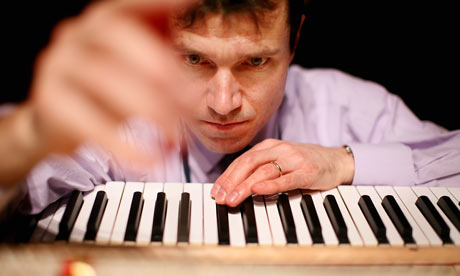Image thanks to the Guardian website.
A question that has puzzled mankind for centuries. Many sleepless night have been had whilst man worries over this important issue. Well, maybe that's an exaggeration, but some people might worry about it. Imagine you are a piano tuner and are moving near the Chicago area. You want to open a piano tuning business, but you're worried that the market is already saturated. There are too many tuners and not enough pianos. How would you decide whether there was space for your business in the city? Well thankfully a man called Enrico Fermi, a famous Italian physicist has done the work for you. He even did it without a phone book. So how did he do it?
Well, he used a basis of assumptions to estimate the number. So lets run through the process.
There are roughly 5million people in Chicago.
On average there are 2 people her household, so there are 2.5 million houses.
Assume that 1 in 20 households has a piano, which they care enough about to tune regularly.
A piano needs to be tuned about 1 time a year.
Assume a piano tuner, including travel time, takes 2 hours to tune a piano.
A piano tuner works 8 hours a day, 5 days a week, 50 weeks a year.
So from this we calculate there are: 2.5million divide by 20 piano owning households multiplied by 1 tuning per year =125thousand piano turnings per year
The average piano tuner in one year repairs: 4 pianos a day, 20 a week, 1000 a year ((8/2)x5x50). This means there are 125thousand divided by 1thousand = 125 piano tuners in Chicago.
But how can we rely on values which are so broad and based on assumptions. Well the idea is that for every value which is a little bit too high, there is a value which is a little bit too low. By combining all of these estimates, which may be a little bit out, we will tend towards the correct value.
This idea can also be transferred to many other problems. Fermi for example calculated the strength on a test nuclear explosion by dropping paper near the blast and noting how far the paper travelled after the blast. It shows that by using a series of approximations one can begin to make strong assumptions. They are not worthy of scientific results, but they are for getting an pre experiment estimate of the value we might get, or for less scientific tests.
How about how many apples are eating in the uk in one year? Or if the land of the whole earth were equally shared between everyone, how much would everyone get? They're great things to jot down on a piece of paper when you're bored, and often you can find the actual answer on the Internet after you've finished.
And before you ask, I don't know how many actual piano tuners there are in Chicago, though a website I found once suggests its near 80. Not a bad guess then!

